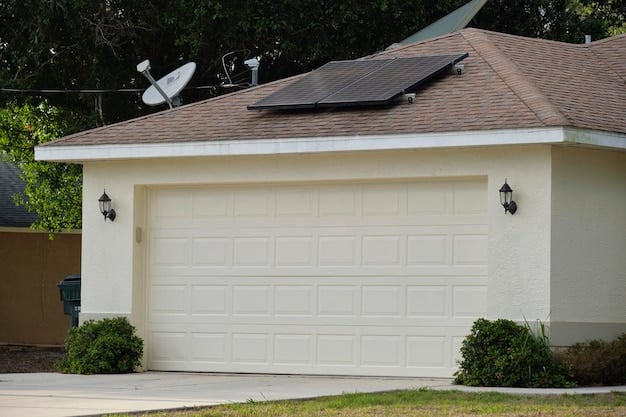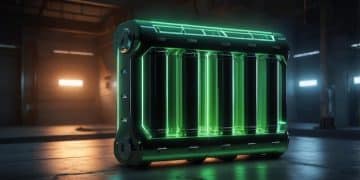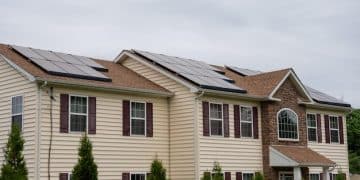Energy Storage System Warranties: A US Consumer Guide

Energy storage system warranties are crucial for US consumers, offering financial protection and peace of mind against potential defects or performance issues in their energy storage investments.
Investing in energy storage can be a smart move for US homeowners. But before you commit, understanding energy storage system warranties is essential to protect your investment and ensure long-term performance.
Understanding Energy Storage Systems
Energy storage systems (ESS) are becoming increasingly popular in the US. These systems, often paired with solar panels, allow homeowners and businesses to store excess energy for later use, providing backup power and reducing reliance on the grid. But what exactly are they, and why are they important?
What is an Energy Storage System?
An energy storage system is essentially a rechargeable battery that stores electrical energy. These batteries are typically lithium-ion and can be integrated with solar panel systems to store excess solar energy generated during the day.
Why are They Important?
ESS offers several benefits, including energy independence, cost savings, and environmental benefits. By storing excess energy, users can reduce their dependence on the grid, lower their electricity bills, and contribute to a more sustainable energy future.
- Provide backup power during outages, ensuring essential appliances and systems continue to operate.
- Allow consumers to use stored solar energy during peak demand periods, reducing reliance on the grid and saving money.
- Help stabilize the grid by providing a buffer against fluctuations in renewable energy production.
Energy storage systems are a valuable addition to any home or business looking to enhance energy efficiency and resilience. Understanding their function and benefits is the first step in making an informed investment.

Types of Energy Storage System Warranties
When purchasing an energy storage system, it’s crucial to understand the different types of warranties available. These warranties provide protection against defects and performance issues, ensuring your investment is secure. Here are the primary types of warranties you should be aware of:
Product Warranty
A product warranty covers defects in materials and workmanship. If the system fails due to a manufacturing issue within the warranty period, the manufacturer will repair or replace the defective components.
Performance Warranty
A performance warranty guarantees that the energy storage system will maintain a certain level of performance over time. This warranty typically specifies a minimum capacity retention rate, ensuring the system continues to store and deliver energy efficiently.
Labor Warranty
A labor warranty covers the cost of labor associated with repairing or replacing a defective energy storage system. This can be a significant expense, so it’s essential to ensure the warranty includes comprehensive labor coverage.
- Comprehensive Coverage: Look for warranties that cover both parts and labor for maximum protection.
- Warranty Duration: Consider the length of the warranty period. Longer warranties provide greater peace of mind.
- Specific Exclusions: Understand what the warranty does not cover to avoid unexpected costs.
Understanding the types of warranties available will help you choose an energy storage system that offers the best possible protection for your investment. Be sure to review the warranty terms carefully before making a purchase.
Key Warranty Terms and Conditions
Navigating the fine print of energy storage system warranties can be daunting. It’s essential to understand the key terms and conditions to ensure you’re adequately protected. Here are some critical aspects to consider:
Warranty Period
The warranty period is the length of time the warranty is in effect. This can vary significantly between manufacturers and models, so it’s essential to compare the warranty periods offered by different providers.
Coverage Details
Coverage details specify what the warranty covers and what it excludes. This includes the types of defects or performance issues that are covered, as well as any limitations or exclusions.
Exclusions
Exclusions are specific conditions or circumstances that are not covered by the warranty. Common exclusions include damage caused by improper installation, misuse, or environmental factors such as extreme weather events.
- Read the Fine Print: Carefully review the warranty document to understand the specific terms and conditions.
- Ask Questions: Don’t hesitate to ask the manufacturer or installer for clarification on any unclear terms.
- Keep Records: Maintain detailed records of the installation date, system specifications, and any maintenance or repairs performed.
Understanding the key terms and conditions of your energy storage system warranty is crucial for protecting your investment. By taking the time to review the warranty details, you can ensure you’re prepared for any potential issues.
Factors Affecting Warranty Coverage
Several factors can impact the validity and extent of your energy storage system warranty. Being aware of these factors can help you maintain your warranty coverage and avoid unexpected costs. Here are some key considerations:
Installation
Proper installation is critical for maintaining warranty coverage. Many warranties require the system to be installed by a certified technician to ensure it meets manufacturer specifications.
Maintenance
Regular maintenance can also affect your warranty coverage. Failure to perform recommended maintenance tasks, such as inspections and cleaning, may void the warranty.
Usage
The way you use your energy storage system can also impact warranty coverage. Overloading the system or using it in a way that is not recommended by the manufacturer may void the warranty.
- Certified Installation: Ensure your system is installed by a qualified and certified technician.
- Follow Maintenance Guidelines: Adhere to the manufacturer’s recommended maintenance schedule.
- Proper Usage: Use the system according to the manufacturer’s guidelines and avoid overloading it.
Being mindful of these factors can help you protect your energy storage system warranty and ensure it remains valid throughout the warranty period. Always consult the warranty document for specific requirements and recommendations.

Navigating Warranty Claims
If you encounter an issue with your energy storage system that you believe is covered by the warranty, it’s essential to know how to navigate the claims process. Here are some steps to follow to ensure a smooth and successful claim:
Documentation
Gather all relevant documentation, including the warranty document, installation records, maintenance records, and any diagnostic reports.
Contact the Manufacturer
Contact the manufacturer or installer to report the issue and initiate the warranty claim process. Be prepared to provide detailed information about the problem and the system’s history.
Follow Instructions
Follow the manufacturer’s instructions for troubleshooting and resolving the issue. This may involve performing diagnostic tests or providing additional documentation.
Navigating a warranty claim can be a complex process, but by being prepared and following the recommended steps, you can increase your chances of a successful resolution.
Future Trends in Energy Storage System Warranties
The energy storage industry is rapidly evolving, and warranty offerings are adapting to meet changing consumer needs and technological advancements. Here are some emerging trends in energy storage system warranties:
Longer Warranty Periods
Manufacturers are increasingly offering longer warranty periods to provide greater peace of mind and attract customers. Extended warranties of 10 years or more are becoming more common.
More Comprehensive Coverage
Warranties are becoming more comprehensive, covering a wider range of potential issues and expenses. This includes coverage for performance degradation, labor costs, and even remote monitoring services.
Data-Driven Warranties
Data-driven warranties use real-time performance data to monitor the health of the energy storage system and proactively address potential issues. This allows for more accurate and efficient warranty claims.
- Proactive Monitoring: Look for warranties that include remote monitoring and diagnostic services.
- Performance Guarantees: Consider warranties that offer performance guarantees based on actual system performance.
- Flexible Options: Explore warranties that offer flexible coverage options to meet your specific needs.
Staying informed about these emerging trends can help you choose an energy storage system warranty that provides the best possible protection for your investment in the long term. As the industry continues to evolve, warranties will likely become even more comprehensive and data-driven.
| Key Aspect | Brief Description |
|---|---|
| 🛡️ Warranty Types | Product, performance, and labor warranties protect against defects and performance decline. |
| ⏱️ Warranty Period | The length of time the warranty is valid; longer periods offer more security. |
| ⚠️ Exclusions | Conditions not covered, like improper installation or misuse, can void warranties. |
| 📊 Future Trends | Emerging trends include longer periods, comprehensive coverage, and data-driven warranties. |
Frequently Asked Questions (FAQ)
▼
A product warranty covers defects in materials and workmanship of the energy storage system. If a component fails due to a manufacturing issue during the warranty period, the manufacturer will repair or replace it.
▼
A performance warranty guarantees the system will maintain a certain level of energy storage capacity over time. It ensures your system continues to efficiently store and deliver energy, typically guaranteeing a minimum capacity retention rate.
▼
A labor warranty covers the costs associated with repairing or replacing a defective energy storage system. This includes the fees for certified technicians to perform the necessary work, which can be a significant expense.
▼
Common exclusions include damage from improper installation, misuse, neglect, or environmental factors like extreme weather. It’s crucial to read the fine print to understand what is not covered to avoid potential surprises.
▼
Ensure your system is installed by a certified technician, adhere to the manufacturer’s maintenance schedule, and use the system according to the recommended guidelines. Keep detailed records of installation, maintenance, and any repairs performed.
Conclusion
Understanding **energy storage system warranties** is paramount for US consumers venturing into energy independence. By grasping the types of warranties, key terms, and emerging trends, you can safeguard your investment and ensure long-term peace of mind with your energy storage solution.





